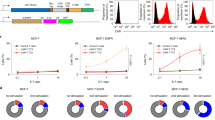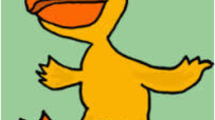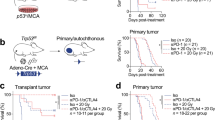Abstract
INDIVIDUAL tumour-associated transplantation antigens (TATA) of chemically induced tumours and histocompatibility antigens (HA) share the ability of inducing transplantation immunity, and have other properties in common, such as the high degree of polymorphism1–3 and a similar cell surface behaviour4. A reciprocal relationship between the quantitative expression of TATA and H-2 antigens has been observed5–6, suggesting the existence of common mechanisms either in their synthesis or in the control of their phenotypic expression. Such indirect similarity prompted us to study the existence of cross reactions between TATA and HA. We therefore determined whether 3-methylcholanthrene (MCA)-induced sarcomata possess TATA-containing allogeneic histocompatibility determinants. Here we report data from two BALB/c fibrosarcomas, ST-5 and B-2.
This is a preview of subscription content, access via your institution
Access options
Subscribe to this journal
Receive 51 print issues and online access
$199.00 per year
only $3.90 per issue
Buy this article
- Purchase on Springer Link
- Instant access to full article PDF
Prices may be subject to local taxes which are calculated during checkout
Similar content being viewed by others
References
Basombrio, M. A., Cancer Res., 30, 2458–2462 (1970).
Demant, P., Transplant. Rev., 15, 162–200 (1973).
Graff, R. J., and Bailey, D. W., Transplant. Rev., 15, 26–49 (1973).
Yefenof, E., and Klein, G., Expl Cell. Res., 88, 217–224 (1974).
Haywood, G. R., and McKhann, C. F., J. exp. Med., 133, 1171–1187 (1971).
Tsakraklides, E., Smith, C., Hersey, J. H., and Good, R. A., J. natn. Cancer Inst., 52, 1499–1504 (1974).
Parmiani, G., Carbone, G., and Lembo, R., Cancer Res., 33, 750–754 (1973).
Fenyo, E. M., Wiener, F., Klein, G., and Harris, H., J. natn. Cancer Inst., 51, 1865–1875 (1973).
Oth, D., and Barra, Y., C.r. hebd. Séanc. Acad. Sci., Paris, 278, 177–180 (1974).
Snell, G. D., Immunogenetics, 1, 1–3 (1974).
Prehn, R. T., J. natn. Cancer Inst., 45, 1039–1045 (1970).
Bodmer, W. F., Transplant. Proc., 5, 1471–1475 (1973).
Martin, W. J., Esber, E., Cotton, W. G., and Rice, J. M., Br. J. Cancer, 28, suppl. 1, 48–61 (1973).
Colnaghi, M. I., and Della Porta, G., J. natn. Cancer Inst., 50, 173–180 (1973).
Author information
Authors and Affiliations
Rights and permissions
About this article
Cite this article
INVERNIZZI, G., PARMIANI, G. Tumour-associated transplantation antigens of chemically induced sarcomata cross reacting with allogeneic histocompatibility antigens. Nature 254, 713–714 (1975). https://doi.org/10.1038/254713a0
Received:
Issue Date:
DOI: https://doi.org/10.1038/254713a0
This article is cited by
-
Chromosomal assignment of the gene encoding the mouse tumor rejection antigen gp96
Immunogenetics (1988)
-
Adoptive immunotherapy of disseminated malignancies
La Ricerca in Clinica e in Laboratorio (1983)
Comments
By submitting a comment you agree to abide by our Terms and Community Guidelines. If you find something abusive or that does not comply with our terms or guidelines please flag it as inappropriate.



